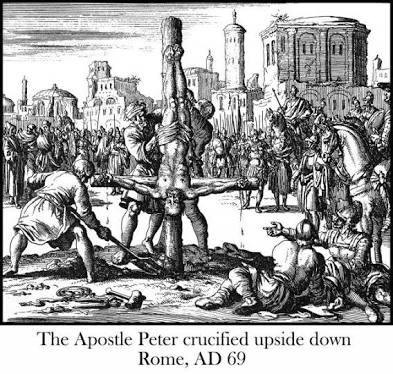Did the Apostle Peter EVER Visit Rome?

Fulfilling the instruction of the Lord to his disciples when faced with times of persecution (Mat. 10:23). Peter sought a place of greater safety, and is next mentioned as being present at the Jerusalem Conference (Acts 15:7).
Peter, having fled Jerusalem, had gone to ‘another place’ (Acts 12:17). This place was not Rome, as is often thought. This idea is based on the book of Revelation, where Rome is compared with Babylon. However, the Babylon referred to at the end of 1Peter denotes an actual place. To ensure that Herod could not find him, the apostle had to leave the territory of the Roman Empire. For that reason, he went to Babylon, where there was a Jewish community. From there he writes to Gentile Christians in Asia Minor,
According to Peter’s own testimony, he composed his first letter while at Babylon. (1Pe 5:13) Possibly also from there he wrote his second letter. Available evidence clearly shows that “Babylon” refers to the city on the Euphrates and not to Rome, as some have claimed. Having been entrusted with ‘the good news for those who are circumcised,’ Peter could be expected to serve in a center of Judaism, such as Babylon. (Gal 2:8, 9)
There was a large Jewish population in Babylon. The Encyclopaedia Judaica (Jerusalem, 1971, Vol. 15, col. 755), when discussing production of the Babylonian Talmud, refers to Judaism’s “great academies of Babylon” during the Common Era. Since Peter wrote to “the temporary residents scattered about in [literal] Pontus, Galatia, Cappadocia, Asia, and Bithynia” (1Pe 1:1), it logically follows that the source of the letter, “Babylon,” was the literal place by that name. The bible Never states that Peter was ever in Rome.
When Paul wrote to the Romans, sending greetings by name to many in Rome, he never mentions or refers to Peter. Had Peter been a leading bishop there, this would have been an unlikely exclusion. Also, Peter’s name is not included among those sending greetings in Paul’s letters written from Rome—Ephesians, Philippians, Colossians, 2 Timothy, Philemon, Hebrews.
The Ecclesiastical Writers of the period succeeding the times of the New Testament, are not reliable. They all belonged to that class of men who set up for successors of the apostles with clerical authority; and where facts were wanting, did not hesitate to substitute conjecture. For our own part, we rely upon nothing ecclesiastical outside the Old and New Testaments. What they testify we believe; but whereon they are silent, we have no faith. Peter may refer to Rome in using Babylon; but there is no evidence that he certainly does. If by Babylon he do indeed mean Rome, it favours the supposition that the Apocalypse was written before his decease; because this is the only Scripture extant in which Rome is certainly comprehended in the name.

No comments:
Post a Comment